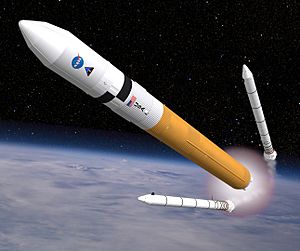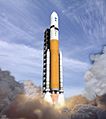Ares V facts for kids

Artist's impression of an Ares V during solid rocket booster separation
|
|
| Function | Cargo Launch Vehicle |
|---|---|
| Country of origin | United States |
| Size | |
| Height | 116 m (381 ft) or 109 m (358 ft) |
| Diameter | 10 m (33 ft) or 8.4 m (28 ft) |
| Stages | 2 |
| Capacity | |
| Payload to LEO | 188,000 kg (414,000 lb) |
| Payload to TLI | 71,100 kg (156,700 lb) or 60,600 kg (133,600 lb) |
| Launch history | |
| Status | Canceled |
| Launch sites | Kennedy Space Center, LC-39B |
| Boosters – 5- or 5.5-segment Shuttle-derived SRB | |
| Engines | 1 solid |
| Fuel | APCP (solid) |
| First stage | |
| Engines | 5 or 6 RS-68B or 5 SSME (RS-25) |
| Thrust | 8,350 kN (1,880,000 lbf) or 10,350 kN (2,330,000 lbf) upper atmosphere (figures for RS-25) |
| Fuel | LH2/LOX |
| Second stage – Earth Departure Stage | |
| Engines | 1 or 2 J-2X |
| Fuel | LH2/LOX |
The Ares V was a plan to create a cargo rocket for the cancelled Constellation program. Ares V was planned to launch the Earth Departure Stage and Altair lunar lander for a plan to return to the Moon in 2019. The Ares V was supposed to complement the Ares I, which was being designed as a crew launch vehicle. The Ares designs were selected for their anticipated overall safety, reliability and cost-effectiveness.
The Ares V was planned to be able to carry about 188,000 kilograms (414,000 pounds) to Low Earth orbit (LEO), and 71,000 kilograms (157,000 pounds) to the Moon. Upon completion the Ares V was planned to be the most powerful rocket ever built, lifting more into orbit than even the Saturn V. Ares V, Ares IV, and Ares I are named after Ares, the Greek god, which is the equivalent to the Roman god Mars.
Related pages
Images for kids
-
Comparison of Saturn V, Space Shuttle, Ares I, Ares IV and Ares V
See also
 In Spanish: Ares V para niños
In Spanish: Ares V para niños



